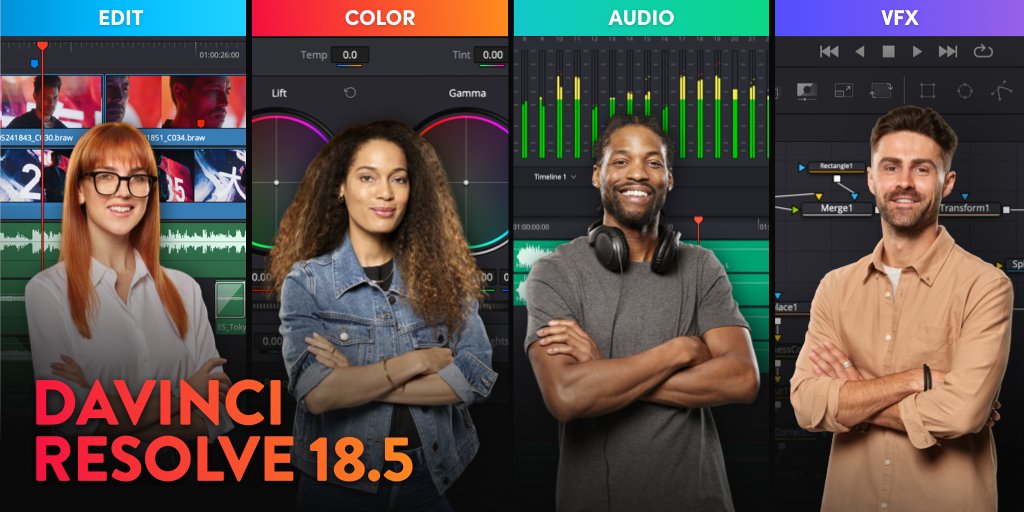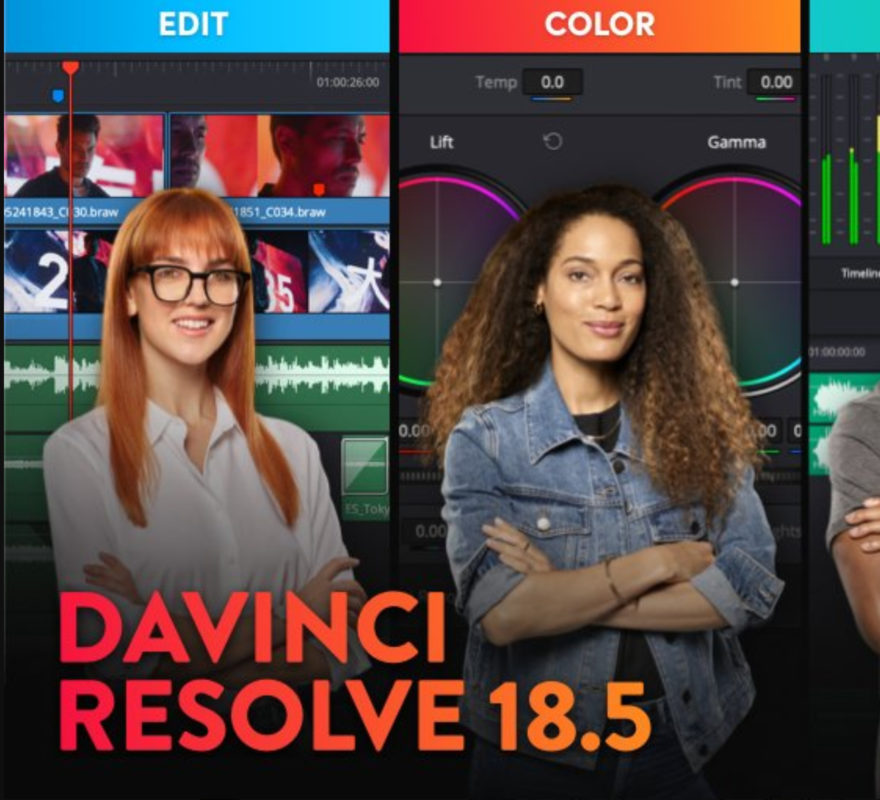Blackmagic Design announced DaVinci Resolve 18.5, a major new update that adds new AI tools, over 150 feature upgrades such as Resolve FX relight, speech-to-text editing, automatic subtitling, AI audio classification, Universal Scene Description file support, and new menus on the Cut page that let users work faster while allowing more time for being creative. DaVinci Resolve 18.5 public beta is available for download now from the Blackmagic Design website.
DaVinci Resolve 18.5 will be demonstrated on the Blackmagic Design NAB 2023 booth #N2601.
DaVinci Resolve 18.5 introduces dozens of new tools, including 4 new AI tools, over 150 feature upgrades, and major updates to the Cut page. Editors can now transcribe audio within clips to search for media based on narrative content or quickly generate subtitles for timelines with the automatic speech-to-text feature. DaVinci Neural Engine AI can analyze and automatically sort audio clips based on classification, and on the Fairlight page audio tracks can now be grouped for faster mix automation and editing. Colorists can use the new Relight FX to add virtual lighting to a scene. VFX artists can collaborate more easily with support for USD files and work faster with the multi-merge tool.
Users can initiate remote monitoring using a Blackmagic ID and a session code. Just enable remote monitoring in DaVinci Resolve and share their code, without having to deal with IP addresses and port forwarding. Users can stream to multiple computers, iPads or even iPhones all at the same time. Users can also now export their timeline to the Blackmagic Cloud using the new Presentations feature which is in public beta for Users with project libraries. With Presentations, multiple people can review their timeline, leave comments and even share a live chat. Comments will appear as markers on their DaVinci Resolve timeline, allowing users to act on feedback quickly.
On the color page, DaVinci Resolve color management can now be configured on a timeline level. Any existing custom timelines are automatically initialized to color management settings from the project. This allows the setting of independent timeline and output color spaces per timeline for projects with mixed media. The new Relight FX lets users add virtual light sources into a scene to creatively adjust environmental lighting, fill dark shadows or change the mood. Light sources can be directional to cast a broad light, a point source, or a spotlight and be adjusted for surface softness and specularity control. The Color page viewer now supports marker overlays and annotations for timeline and clip markers.
The addition of three new menus to the Cut page timeline allows for quicker and more flexible editing. Use the timeline options, timeline actions and edit actions to toggle ripple editing, trim edit points to the playhead, resync audio, and change the appearance of the timeline and more. Scene cut detection is also now possible directly on the Cut timeline. Simply navigate to the timeline menu and click ‘detect scene cuts’. Selected clips will be analyzed for content and cut points automatically placed on every new edit in the rendered clip. Users can modify or remove trim points as needed.
The Cut page has a new ripple button which enables and disables rippled edits. Previously edits were always rippled, now by disabling the ripple button the duration of the edit will be preserved so users can create gaps in the timeline. Users can hold the option key to disable ripple for that edit only. Split A/V allows the edit point for video or audio to be adjusted separately. Simply drag the lower part of a clip to separately adjust the audio track, allowing the dialogue to be heard before or continue after the video clip is seen. Editors can now creatively focus visual attention on the scene using audio to add interest, drama and even tension to dialogue scenes on the Cut page.
The auto subtitle feature on the Cut and Edit pages transcribes speech to text automatically into a subtitle track on the timeline. To activate, simply click ‘create subtitles from audio’ in the timeline menu. Once analyzed, click the individual captions to modify them in the inspector.
Speech-to-text editing has also been added in the ‘transcribe’ feature, which automatically transcribes video and audio clips. Users can search for specific terms or jump to the section of a clip where a word appears. Instead of listening to entire scenes or interviews, Users can quickly locate the topic they need and add it to their timeline saving countless hours.
Content creators can now upload videos directly to TikTok by simply signing in to their TikTok account in preferences, and using either the render preset in the Deliver page or the quick export dialog. A new option for vertical aspect ratio output makes creating content for social media even easier.
Support for the OpenTimelineIO (OTIO) format makes importing and exporting timelines from other NLE applications faster and easier. OTIO supports metadata for clips, timing, tracks, transitions and markers, as well as information about the order and length of cuts and references to external media. Plus users can also now quickly backup and restore their work by enabling per timeline backups in preferences. Modified timelines will be backed up locally for both collaborative and non collaborative projects on local, network and Blackmagic Cloud project libraries for greater security on multi user projects.
Audio engineers are now able to combine related audio tracks or mixer channels into groups, enabling shared mix automation or editing operations. When creating groups, users can determine the parameters they will share. Groups can be nested, or temporarily suspended to quickly switch focus to smaller groups or individual tracks. The DaVinci Neural Engine can now classify audio clips based on their content, making editing choices faster when reviewing unfamiliar materials. After analysis, audio clips appear in bins cateorized for dialogue, music and effects with detailed sub categories such as explosions, water or insects.
When using elastic wave processing to retime audio clips, the new ‘voice’ option offers natural sounding, high quality results when changing the speed of dialogue or singing, even when using more extreme keyframing.
Blackmagic DaVinci Resolve 18.5 Features
- Multiple Cut page improvements.
- Support for Blackmagic Cloud Presentations.
- DaVinci Neural Engine based subtitles from audio in Studio.
- DaVinci Neural Engine powered text based editing in Studio.
- New Resolve FX relight tool for adding virtual light sources
- Support for Universal Scene Description based workflows in Fusion.
- New Fusion multi-merge tool to composite and manage multiple layers.
- Multiple remote monitoring improvements.
- Support for fast per timeline backups.
- Per timeline Resolve Color Management.
- Support for edit and mix groups in Fairlight.
- Support for AI based audio classification in Studio.
Availability and Price
DaVinci Resolve 18.5 public beta is available now for download from the Blackmagic Design website.



